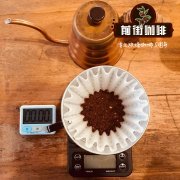The Bolivian name producing area is La Paz, including Karanawi, north and south, Yongster Inkihivi, etc.

Professional coffee knowledge exchange more coffee bean information please follow the coffee workshop (Wechat official account cafe_style)
Bolivia is such a potential producing area, but it is only a small coffee export producing area, accounting for less than 0.1% of the global output. Why?
However, Bolivian production has declined year by year in recent years. From 1997 to 2014, the export volume dropped to only 1 stroke 4 every year. According to Roast Magazine, its coffee production ranked 38th and even lagged behind the United States, which ranked 35th.
The main reason is the backward economic development and infrastructure of Bolivia. Bolivia is still the poorest country in South America. Although Bolivia's unique changeable terrain is beneficial to the growth of coffee, poverty and poor infrastructure are key factors in coffee processing, transportation and quality.
The most famous producing area in Bolivia is La Paz, including Caravani, North & South Yongas, Inquisivi and so on. The region is best known as one of the most dangerous roads in the world, nicknamed Yongas Road of the Road of death, also known as "the most dangerous road in the world".
To the north of Yonggaz Road, there is a sharp drop of at least 600m (1830 feet), most of which will not exceed 3.2m (10ft) of single-lane width, and the lack of guardrail along the road makes the road very dangerous.
When it is not 05:00, Rain Water, fog and dust will also reduce the visibility of driving. On some sections of the road, the road is very muddy, and from time to time there are loose falling rocks, which can accidentally run out of control and rush down the valley. According to official statistics, there are an average of about 209 traffic accidents on Yongjas Road each year, resulting in 96 deaths.
In such a dangerous road, no wonder it is not easy for Bolivia to export coffee beans, and it is also very difficult for the outside world to obtain. The delicacy of heaven, but on the road of death
END
Important Notice :
前街咖啡 FrontStreet Coffee has moved to new addredd:
FrontStreet Coffee Address: 315,Donghua East Road,GuangZhou
Tel:020 38364473
- Prev

Less than 40% of Bolivia's coffee culture is Arabica, such as iron pickup.
Professional coffee knowledge exchange more coffee bean information Please pay attention to the coffee workshop (Wechat official account cafe_style) Bolivia's coffee production is mainly a small farmer production system, the country has 23000 small farms ranging in size from 2 to 9 hectares, and in particular, about 40% of Bolivia's coffee culture is mainly for domestic sales. The main variety is Arabika.
- Next

How do you drink Sumatran coffee beans? what is the flavor of Indonesian Azimanine G1 coffee?
Coffee workshop (Wechat official account cafe_style) Mantenin coffee beans from Sumatra, Indonesia, Asia, also known as Sumatra coffee beans, the flavor is very rich, with fragrance, bitterness and a little sweetness, and can even taste slightly sour, the sour taste is very comfortable, not exciting. Then why?
Related
- Detailed explanation of Jadeite planting Land in Panamanian Jadeite Manor introduction to the grading system of Jadeite competitive bidding, Red bid, Green bid and Rose Summer
- Story of Coffee planting in Brenka region of Costa Rica Stonehenge Manor anaerobic heavy honey treatment of flavor mouth
- What's on the barrel of Blue Mountain Coffee beans?
- Can American coffee also pull flowers? How to use hot American style to pull out a good-looking pattern?
- Can you make a cold extract with coffee beans? What is the right proportion for cold-extracted coffee formula?
- Indonesian PWN Gold Mandrine Coffee Origin Features Flavor How to Chong? Mandolin coffee is American.
- A brief introduction to the flavor characteristics of Brazilian yellow bourbon coffee beans
- What is the effect of different water quality on the flavor of cold-extracted coffee? What kind of water is best for brewing coffee?
- Why do you think of Rose Summer whenever you mention Panamanian coffee?
- Introduction to the characteristics of authentic blue mountain coffee bean producing areas? What is the CIB Coffee Authority in Jamaica?

